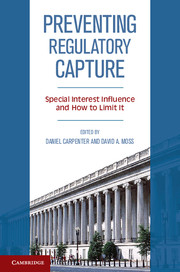Book contents
- Frontmatter
- Contents
- List of Figures
- List of Tables
- Editors
- Contributors
- Preface
- Acknowledgments
- Introduction
- Section I Failures of Capture Scholarship
- Section II New Conceptions of Capture – Mechanisms and Outcomes
- 4 Cultural Capture and the Financial Crisis
- 5 Complexity, Capacity, and Capture
- 6 Preventing Economists’ Capture
- 7 Corrosive Capture? The Dueling Forces of Autonomy and Industry Influence in FDA Pharmaceutical Regulation
- Section III Regulatory Case Studies
- Section IV The Possibility of Preventing Capture
- Conclusion
- Afterword
- Index
- References
6 - Preventing Economists’ Capture
Published online by Cambridge University Press: 05 June 2014
- Frontmatter
- Contents
- List of Figures
- List of Tables
- Editors
- Contributors
- Preface
- Acknowledgments
- Introduction
- Section I Failures of Capture Scholarship
- Section II New Conceptions of Capture – Mechanisms and Outcomes
- 4 Cultural Capture and the Financial Crisis
- 5 Complexity, Capacity, and Capture
- 6 Preventing Economists’ Capture
- 7 Corrosive Capture? The Dueling Forces of Autonomy and Industry Influence in FDA Pharmaceutical Regulation
- Section III Regulatory Case Studies
- Section IV The Possibility of Preventing Capture
- Conclusion
- Afterword
- Index
- References
Summary
When economists talk about regulatory capture, we do not imply that regulators are corrupt or lack integrity. In fact, if regulatory capture were due solely to illegal behavior, it would be simpler to fight. Regulatory capture is so pervasive precisely because it is driven by standard economic incentives, which push even the most well-intentioned regulators to cater to the interests of the regulated. These incentives are built into their positions. Regulators depend on the regulated for much of the information they need to do their job properly, and this dependency encourages regulators to cater to the regulated. The regulated are also perhaps the primary audience of the regulators, as taxpayers and citizens more generally have much less incentive to monitor regulation, and generally remain ignorant. Hence the regulators will tend to perform their job with the regulated, rather than the public, in mind, further encouraging the regulators to cater to the interests of the regulated. Finally, career incentives play a big role. The regulators’ human capital is highly industry-specific, and many of the best jobs available to them exist within the industries they regulate. Thus, the desire to preserve future career options makes it difficult for the regulator not to cater to the regulated.
- Type
- Chapter
- Information
- Preventing Regulatory CaptureSpecial Interest Influence and How to Limit it, pp. 124 - 151Publisher: Cambridge University PressPrint publication year: 2013
References
- 21
- Cited by



